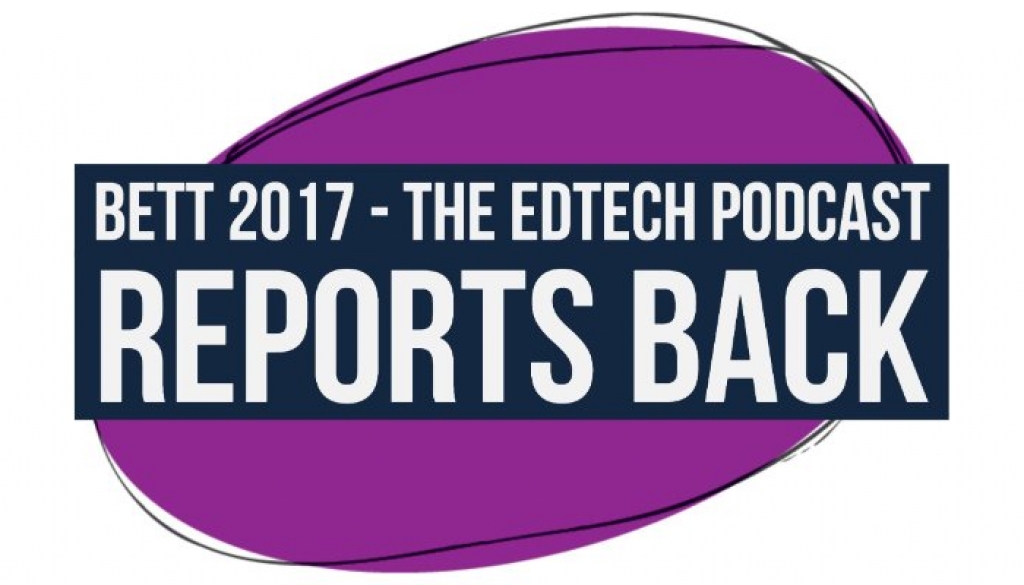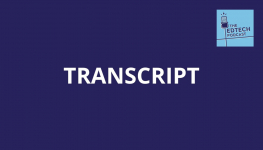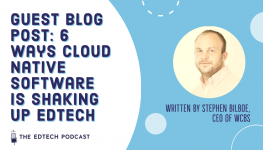Bett 2017 – The Edtech Podcast reports back

This was a big week for The Edtech Podcast.
The Education World Forum, Education Innovation Conference and, (the mothership), Bett, were all in town. That meant over 30 hours of interview recordings, plus international collaboration meetings, playing a supporting role in the TES leaders event, moderating panels and chairing LIVE podcast recordings.
Who did I record with this week? Among the many disparate perspectives were:
- Andreas Schleicher, Director for the Directorate of Education and Skills, OECD/PISA
- Richard Taylor, Investor and Edtech advisor, Media Taylor
- Imogen Heap, Award-winning tech-enthusiast musician and collaborator
- Ron Reed, Executive Producer, SXSW Edu
- ICT Co-ordinators, from Belgium and school children from Islington, London
- Justin van Fleet, Chief of Staff to Rt. Honourable Gordon Brown, Office of the UN Special Envoy for Global Education
- Hanan Al Hroub, Global Teacher Prize Winner, Palestine
The Bett Edtech trends episodes will be coming out over the next weeks and months. If you are interested in sponsoring these episodes (which are free to download) you can get further details at theedtechpodcast@gmail.com.
Before that all kicks off, here are my immediate thoughts on trends from the event.
Times are tough
The backdrop to numerous conversations was of tough times financially.
The latest BESA ICT Spending in UK State Schools report showed the current projection is for ICT budget allocations for computers to decline from £280m in 2015/16 to £237m in 2016/17, with an overall drop in ICT spend of £34m (especially hitting devices, with a slight uplift on services/software YoY).
In podcast recordings with two ICT co-ordinators from Belgium, they said this situation was similar in-country. Education Technology association NAACE have released a procurement service which advises on value and impact for schools, in collaboration with the DFE, to assist in this climate.
Indeed, UK Education Secretary Justine Greening could not deliver her scheduled Bett keynote due to being called for voting on theschool funding bill on the 25th January.
The likely outcome of this situation is more consolidation on the supplier side, or diversification into B2C and international (see below). MAT procurement efficiencies or informal school/departmental clusters being more savvy about purchasing power may offer some assistance, but at the same time Brexit is also putting the squeeze on UK pricing. (I met one secondary school leader looking to buy two robots with a budget of £6,000 only to be told prices had gone up due to Brexit and returning home empty handed). Will we see more ‘poundland pedagogy’?
International from the off
Given the UK squeeze on budgets, UK Edtech companies are now launching with international expansion in mind from the off. With the quality and creativity brand of UK education still very tangible, Asia is especially opportune. But, international education and edtech is, at the same time, entering the UK market and seeing Bett as a hub for global conversation.
This year, there were more international pavilions than ever – the Netherlands, Norway, Korea, Ireland, Israel, UAE and France were among the most memorable. Will this increase knowledge sharing of domestic approaches to education or will we stay in our silos?
I’m yet to read it, but I was introduced to this book on the topic this week which I look forward to diving into.
Student/Teacher Ratio
The ‘Oxford model’ of 1:1 student and teacher relationships is under immense pressure. With rapid population growth, increasing middle classes, and increasing demands for quality education and school places, something has to give.
It is not surprising that online tutoring companies like Tute are doing well and winning awards, as they satisfy our notions of personal educational development.
Meanwhile, the correlation between larger class sizes and student outcomes is not always negative, where increased time on teacher CPD and planning time is allowed (notwithstanding the ‘how do you measure outcomes argument’). As we have seen from Finland, increased time in the classroom does not always equate to better results.
Where are the chatbots?
Given the above pressure on student:teacher ratios, I was surprised to not see chatbots at Bett 2017. Chatbots can save teachers and education institutions time in communication with student groups on FAQs, and with parents on general information. They can also develop intrigue and curiosity around subjects, as our understanding of teaching/learning increasingly spills out into the fringes of gaming, culture, personal development, TED Talks, podcasts, reading and other day-to-day non-school activities.
My belief is it won’t be very long before every VLE has an integrated chatbot, who is developing each of these is the question.
VR – can we go beyond leaping dolphins into simulated science labs?
In conversation around the show, VR came out as a top trend. I put that down to the fact that it was more obviously represented around the exhibition floor. My question is around how applicable this still is within a school environment.
I am less excited about the engagement piece for kids, than I am around how VR may actually tackle some of the budget cut and student:teacher ratio issues discussed.
For example, in conversation with Dr Jess Wade she talked about how her love of chemistry really kicked off in the lab and how unfortunate it was that lab access is not something that can scale for every student. With some of the more simulation specific applications of VR, the ability to practice chemistry experiments and outcomes with expensive tools in a safe environment does become intriguing.
Digital Skills, Attitudes and Values
This years STEAM Village had expanded considerably, but the discussion around coding has become more sophisticated. If AI is to automate basic maths functionality, won’t coding go that way too? Why, then, are we teaching our kids to code? Shouldn’t we be focusing more on the collaborative problem solving aspect of coding and digital skills literacy needed for the 4th industrial revolution? This is something the global ministers of education grappled with at the Education World Forum and EFF. Gavin Dykes, Co-Founder, Education Fast Forward also called on us to spend more time on the attitudes and values (vs knowledge and skills) as we enter this era. I moderated a discussion with Sophie Deen, Detective Dot, Dr Jess Wade, Imperial College and Jen Gratton, Make:Do on resources for teachers looking to embrace cross-curricular learning, which you can listen to here:
AI
AI was a hot topic at Bett 2017. (Nothing gets to the heart of the matter like the potential to lose your job or become societally irrelevant). CenturyTech’s presentation in the arena was reportedly very busy; teachers have a tough task steering student skill development into an increasingly uncertain future. Drawing on user-centred design and increasingly developing educational resources which are child-led are something the less direct-to-school start-ups are grappling with.
Efficacy beyond measuring standards
With much chat around efficacy, Pearson’s VP Impact Evaluation, Carmen Arroyo laid out their latest collaboration with Barbara Means of SRI International. The discussion which followed looked at how we could broaden what is meant by ‘impact’. How can we start measuring all those skills, values and attitudes which might evade AI and sit outside of some of the comparative tables out there?
I’d love to hear from you below on what made an impact with you at Bett 2017. And don’t forget to subscribe to The Edtech Podcast to hear from many contributors in 2017.
Have a good week 🙂


